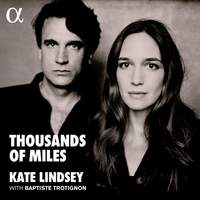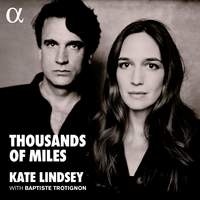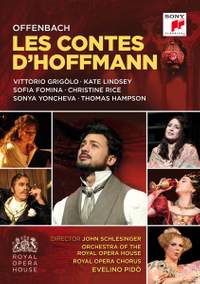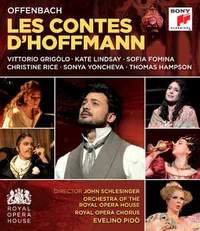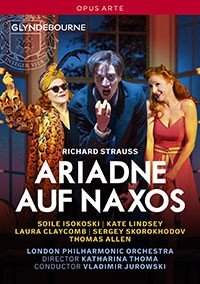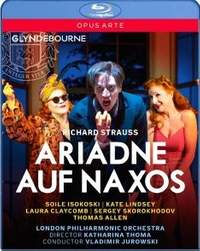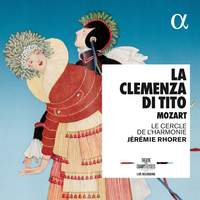Interview,
Kate Lindsey on Thousands of Miles
 The elegant young American mezzo Kate Lindsey has been making quite the impact in opera-houses on both sides of the Atlantic over the past couple of years - I first came across her as a louche, witty Nicklausse (morphing into an unrecognisably glamorous Muse) in Les contes d'Hoffmann opposite Vittorio Grigolo at The Royal Opera House last year (now available to pre-order on DVD and blu-ray), and she's also had great success as Der Komponist in Ariadne auf Naxos at Glyndebourne (where she returns next year in another Strauss trouser-role, Octavian), both Sesto and Annio in La clemenza di Tito, Zerlina in Don Giovanni, and Cherubino in Le nozze di Figaro.
The elegant young American mezzo Kate Lindsey has been making quite the impact in opera-houses on both sides of the Atlantic over the past couple of years - I first came across her as a louche, witty Nicklausse (morphing into an unrecognisably glamorous Muse) in Les contes d'Hoffmann opposite Vittorio Grigolo at The Royal Opera House last year (now available to pre-order on DVD and blu-ray), and she's also had great success as Der Komponist in Ariadne auf Naxos at Glyndebourne (where she returns next year in another Strauss trouser-role, Octavian), both Sesto and Annio in La clemenza di Tito, Zerlina in Don Giovanni, and Cherubino in Le nozze di Figaro.
When I heard just before Christmas that Alpha would be releasing her debut solo recording this spring, I was expecting a calling-card that reflected her recent work in the opera-house - a collection of Mozart arias, or maybe a recital of Strauss lieder - so when a disc of Kurt Weill (interspersed with songs by Zemlinsky, Korngold and Alma Mahler) landed on my desk six weeks ago I'll admit I did a bit of a double take: before I hit PLAY I couldn't quite associate the cool, classy lyric mezzo I'd enjoyed so much at Covent Garden with the raspy, ribald world of Pirate Jenny and Nanna! But it works: not only does Lindsey characterise Weill's rogues' gallery with the same care she brings to her stage roles (no generic whiskey-bar smouldering here), but the songs seem to uncover new colours and timbres in her voice, and there's none of the self-consciousness that can sometimes dog 'classical' singers who venture into this territory.
I've been playing this on my commute for the past month now, so it was a pleasure to speak to Kate last week about how the project came about, her partnership with the French jazz pianist Baptiste Trotignon, and what she's discovered about her voice in the process of exploring this repertoire.
Before coming to this project, what sort of background did you have in cabaret and musical theatre – was it comparatively new territory for you, or something that you’d already explored during your training and early career?
I actually started out more firmly rooted in the sounds of musical theatre rather than classical music. As a child, my mother and I would watch all the old classic movie musicals together, and I was completely enchanted with anything to do with live performance on TV (and a few flashy sequined costumes always kept me dreaming!). It wasn't until I was 15 and started training in voice with a classical music teacher that I really became exposed to solo classical music and opera.
What do you see as the potential pitfalls (or opportunities!) for a ‘classical’ singer venturing into this territory?
I think sometimes within the classical music business, people can find comfort in being able to place a musician within a strict repertoire category. Somehow it can help with clarity in casting, both in opera and concert work. I certainly recommend that young singers starting out in their careers do have a clear sense of where their voice 'lives'. I'm not necessarily sure about the pitfalls of venturing into this territory (check in with me in a few years!), but what I've enjoyed in this project has been discovering all these new areas of the voice that emerged directly through the repertoire itself. I endeavoured to respond to the true sensibility and characterisation of each song rather than to impose my classically trained "sound" upon the music.
A lot of the Weill songs sit a good bit lower than most of your operatic repertoire – did you have to do much technical exploration to make them work, or is that strong chest-voice something you just keep relatively under wraps as a high lyric mezzo?!
Funnily enough, that part of my voice has only really emerged in very recent years. Age, experience and courage probably have a little something to do with it. When I'm learning a new role, I usually sing lightly down in that low register until I'm very secure with the structural and harmonic framework of the music. I find, especially with modern music, this truly saves my voice. So, maybe I was building towards this for a while, and then when we went into the studio to record for those three days I just went for it! The discovery happened right in front of the microphone, in fact!
You write in the sleeve-notes about you and Baptiste ‘coming from two different worlds’ – how did you first meet, and can you tell me a little about the exchange of ideas that went on in preparing this programme?
Baptiste and I were introduced through Didier Martin who produced the album. I was working through the initial idea of Kurt Weill with Didier, and he recommended that I meet Baptiste to see how we might get on. We met in a hotel cafe just outside of Gare du Nord one day in October, and I put a big pile of music and ideas in front of him. While he might have been rather taken aback at first(!), he dove straight into the work, and multitudes of emails later, we had a couple pages of repertoire to begin exploring. We began meeting periodically to go through rep and just get to know each other, and it came together rather organically. I think what is quite valuable is that we care about the whole sense of the project and less about how we are each personally perceived.
Have any specific singers especially influenced you in this repertoire, either from the classical side (Anne Sofie von Otter), or the likes of Lotte Lenya, Ute Lemper and Gisela May?
Marlene Dietrich is definitely at the top of my list of influences. I've had a real fascination with her for quite a long time, which started from the video of her screen test for the 1930 movie The Blue Angel. She captured me there, and I was hooked. I also went to see Ute Lemper live in concert when I was living in NYC, and she offered a powerful insight into a modern take on this classic repertoire. She's an incredibly strong presence. I've read and listened to a lot of Lotte Lenya as well. She was essential to understanding the voice for whom Weill was composing.
The songs by Korngold, Alma Mahler and Zemlinsky work so beautifully interspersed between the Weill like this – how did the idea to include them come about, and how much similarity do you find between their sound-worlds and themes?
We wanted to include contemporaries of Weill in order to have a more rounded view of the world from which he was emerging as a composer. All of these composers knew each other (some more intimately than others!) from their roots in Germany and Austria and eventually to the US. Within the more 'classical' songs, we can hear the harmonic shifting and searching that, in effect, is leading into a jazz sound. Baptiste would often improvise with some of the song transitions when we rehearsed, and it created this constant reminder that these pieces, in fact, were more closely related than we would necessarily realise in our "protected worlds of music".
Finally, do you harbour any ambitions (or have any plans you can share!) to do The Seven Deadly Sins, Mahagonny, The Threepenny Opera or Street Scene on stage...?
At this moment, there aren't any of these plans in place, but it's certainly something I'd consider if it came along. I'm still very heavily living in opera and concert projects, and, funnily enough, as a result of this album I'm getting this question more and more often! One never knows what the future will bring, and I'm ever curious to see what's going to happen! What is mostly occupying my thoughts these days is planning for the next album!
Thousands of Miles: Songs by Kurt Weill, Zemlinsky, Korngold and Alma Mahler
Kate Lindsey (mezzo), Baptiste Trotignon (piano)
'Lindsey never sounds as if she’s dragging her voice anywhere it doesn’t want to go. She is incisive with text, in German and English alike.' (The Times)
Available Formats: CD, MP3, FLAC, Hi-Res FLAC
The vinyl edition will be released on 23rd June.
Available Format: Vinyl Record
Other recordings featuring Kate Lindsey
Offenbach: Les Contes d'Hoffmann (DVD)
Vittorio Grigolo (Hoffmann), Kate Lindsey (Nicklausse/Muse), Christine Rice (Giulietta), Sonya Yoncheva (Antonia), Sofia Fomina (Olympia), Thomas Hampson Coppélius/Dapertutto/Lindorf/Miracle)); Royal Opera House, Evelino Pidò, John Schlesinger (dir.)
Release scheduled for 7th July.
Available Format: DVD Video
Offenbach: Les Contes d'Hoffmann (Blu-ray)
Vittorio Grigolo (Hoffmann), Kate Lindsey (Nicklausse/Muse), Christine Rice (Giulietta), Sonya Yoncheva (Antonia), Sofia Fomina (Olympia), Thomas Hampson Coppélius/Dapertutto/Lindorf/Miracle)); Royal Opera House, Evelino Pidò, John Schlesinger (dir.)
Release scheduled for 7th July.
Available Format: Blu-ray
Strauss: Ariadne auf Naxos (DVD)
Soile Isokoski (Ariadne), Kate Lindsey (Composer), Laura Claycomb (Zerbinetta), Sergey Skorokhodov (Bacchus), Thomas Allen (Music Master); London Philharmonic Orchestra, Vladimir Jurowski, Katharina Thoma (dir.)
'Lindsey's Composer is beautifully detailed and, though a mezzo, her voice has a soprano-like colour and ease.' (Gramophone)
Available Format: DVD Video
Strauss: Ariadne auf Naxos (Blu-ray)
Soile Isokoski, Kate Lindsey, Laura Claycomb, Sergey Skorokhodov, Thomas Allen; London Philharmonic Orchestra, Vladimir Jurowski, Katharina Thoma (dir.)
'Lindsey's Composer is beautifully detailed and, though a mezzo, her voice has a soprano-like colour and ease.' (Gramophone)
Available Format: Blu-ray
Mozart: La clemenza di Tito
Kate Lindsey (Sesto), Kurt Streit (Tito), Karina Gauvin (Vitellia), Julie Fuchs (Servilia), Julie Boulianne (Annio); Le Cercle de l’Harmonie, Jérémie Rhorer
'Lindsey is a fine Sesto who excels in the set-piece aria ‘Parto, parto’'. (BBC Music Magazine)
Available Formats: 2 CDs, MP3, FLAC, Hi-Res FLAC


